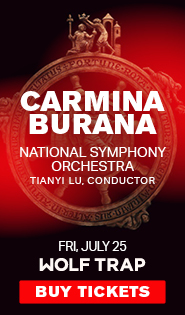Raskatov concerto highlights a blazing Russian night with Noseda, NSO

Oboist Alexei Ogrintchouk was the soloist in Alexander Raskatov’s Time’s River with Gianandrea Noseda leading the National Symphony Orchestra Thursday night at the Kennedy Center. Photo: Scott Suchman
For a decade at the turn of the last century, Gianandrea Noseda was guest conductor at the Mariinsky Theater in St. Petersburg. The Italian conductor came back to those roots with this week’s all-Russian program. Thursday night’s performance in the Kennedy Center Concert Hall revealed a conductor in excellent form and a living composer well worth the acquaintance.
The evening opened with Prokofiev’s Summer Night, which is just about how the unseasonable weather outside felt on this Halloween. The piece is a lesser-known suite of five movements, excerpted in 1950 from the composer’s comic opera Betrothal in a Monastery, premiered four years earlier.
A broad, even pompous trumpet melody announced the grand nature of the first movement. This rhymed well with the third movement, an absurd waltz taken by Noseda at an appropriately ponderous tempo. The evening’s oboe solos fell again to the highly capable Harrison Linsey. (Principal oboe Nicholas Stovall is on sabbatical this season and assistant principal Jamie Roberts is on maternity leave.)
The highlights were the two slow movements, with music for the opera’s two couples in love. In the second movement, the charming melody introduced by solo cello spread warmly through the string and woodwinds. The strings outshone themselves in the fourth movement, featured in luscious textures against lovely solos for flute and clarinet. The martial percussion punctuating the fifth movement sounded almost like a tribute to Ravel’s Bolero.
It is a rare thing to be thoroughly convinced by a new concerto, but such was the experience of Time’s River, the new oboe concerto by Russian composer Alexander Raskatov. Inspired by themes of “the suffering of the earth,” taken from a poem by Gavrila Derzhavin, the piece was premiered in 2022 by the Royal Concertgebouw Orchestra in Amsterdam, which co-commissioned the concerto with the NSO.
To balance the smaller sound of the solo instrument, Raskatov limited himself to a lean orchestration: just twenty-two strings, piccolo, E-flat clarinet, two horns, two trombones, trumpet, and a raft of percussion. The range of sounds tickled the ear with endless variety, from the opening hum of temple gong to the comic sighs of slide whistles and even small fans that blew air through mellow wind-chimes.
Alexei Ogrintchouk, principal oboist of the Royal Concertgebouw Orchestra since 2005, mastered the solo part with unmatched authority. From the pastoral piping of the first movement, to the stratospheric writing of the second movement, to ugly squawks and microtonal bends at the edge of playability, Ogrintchouk constantly surprised and convinced with his playing.
In the third movement, air blown through the wind instruments provided a mysterious aura, going with the exotic metallic percussion and col legno strikes in the strings. Still, it was the neoclassical turn of the sixth and final movement that most surprised, with solemn drones underscoring a tragic, truly beautiful melody, hypnotic in its allure. At twenty-five minutes, the piece never wandered or bored the listener, leaving one wanting to hear it again.
Ending with Tchaikovsky’s Symphony No. 6 (“Pathétique”) seemed a bit hollow on the surface, a reward to conservative audiences for sitting through music less than a century old. Noseda had other ideas, turning in one of the most incisive, affecting renditions of this familiar score, last heard from the NSO in 2023.
The symphony opened in a morose mood, with double-basses and violas supporting a deep melody in the bassoon. Noseda moved the orchestra through the sentimental secondary theme in D major, avoiding the temptation to wallow in the emotion by unpredictable surges forward in his pacing. The booming start of the development section provided an appropriately seasonal jump scare. The regal brass section thundered in numerous sonic climaxes.
The second movement’s uneven waltz, in 5/4 meter, came off more urbane than irregular, with a flowing tempo and gracious legato style. The third movement, a crisply defined march, came to an explosive conclusion, but Noseda managed to forestall applause from the well-behaved audience with a careful continuing gesture.
A deep sense of unnamed tragedy returned for the Finale, cranked up in emotional intensity carefully, step by step, in Noseda’s interpretation. After charging through the loudest passages, the closing string lament ebbed achingly in sound, until only the divided cellos and double-basses remained.
The program will be repeated 11:30 a.m. Friday and 8 p.m. Saturday. kennedy-center.org


Posted Nov 01, 2024 at 2:05 pm by Robert Cohn
Thank you for your very quick review of last night’s concert. I thought Noseda’s performance of the Tchaikovsky 6th was the best rendition of that symphony I ever heard. Period. He payed homage to Tchaikovsky’s own markings (many conductors do not). The end of the last movement was a real tear jerker, particularly Noseda’s 60-second pause after the final notes were heard.